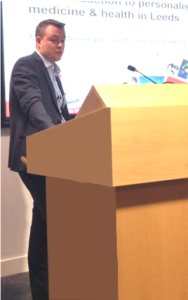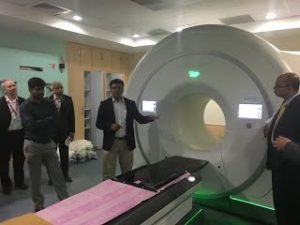9th January 2017 Mumbai, India
Exploring precision medicine at the India-UK Tech Summit
Dr Michael Messenger (Mike), Head of the Leeds Centre for Personalised Medicine and Health, was in India in November 2016. Leeds is one of the leading centres of excellence designated by the UK Precision Medicine Catapult (PMC) and is taking a whole-system city wide approach to bring the benefits of precision medicine and health to its population, improving patient outcomes, whilst reducing waste and saving money. Mike’s research focuses on developing and evaluating diagnostic tests with the potential to improve the health of patients and population by efficiently using the NHS resources. In this blog, Mike shares his experience about his visit to India and summarises the potential UK-India collaboration opportunities in the precision medicine space.
I was invited to India by the UK Science and Innovation Network for a four day programme on precision medicine in New Delhi, Bangalore and Chennai in November 2016. It was my first ever visit to India and I was interested to understand the Indian precision medicine landscape. We joined the British Prime Minister Theresa May and Indian Prime Minister Narendra Modi at the recent India-UK Tech Summit. The summit was aimed at forging new collaborations between the two countries and involved series of activities. The Summit was attended by government ministers, and leaders in industry, research and healthcare. It offered an opportunity to explore how the UK and India might work together in areas such as healthcare and life sciences, advanced engineering and manufacturing, Smart Cities etc.
The key initiatives under discussion during the summit included plans to develop Smart Cities in India, and a series of joint research initiatives worth up to £80 million, announced by Jo Johnson, Minister for Universities, Science, Research and Innovation. These are supported by the UK Government and Indian partners through the Newton Fund to address major global challenges including, anti-microbial resistance, water quality and healthcare.
The UK’s growing capabilities in precision medicine make it an attractive partner for developing new initiatives and partnerships and a number of events at the summit were dedicated to this topic. I attended the summit as part of a team led by Prof Richard Barker, Chairman of the PMC, meeting with Indian commercial and government organisations to explore the potential for collaborations. In particular, I attended events including panel discussions in New Delhi and Bangalore on role of precision medicine and next generation healthcare, and workshops on precision medicine held in Bangalore and Chennai. During these workshops the delegates focused on Indian and British approaches to precision medicine and explored partnership opportunities with Indian institutions and companies.
 I feel there’s an enormous potential to create collaborations across shared areas of healthcare and the drive to develop these opportunities among our partners in India – especially within the Smart Cities initiative – is genuinely exciting. Particular priorities in the field of precision medicine would be targeting infectious disease, cardio-metabolic disease, cancer and rare genetic disorders. There is also the potential to exchange research insights and data between Indian and UK organisations and engage in joint training and education programmes to help embed precision medicine principles in research practice, as well as at clinical, industry and policy levels. An opportunity of particular interest to the NIHR Diagnostic Evidence Co-operative (DEC) involves partnering with Indian institutions to develop the evidence base for pharmacogenomic research, an initiative that could lead to improved healthcare for UK-Asian populations.
I feel there’s an enormous potential to create collaborations across shared areas of healthcare and the drive to develop these opportunities among our partners in India – especially within the Smart Cities initiative – is genuinely exciting. Particular priorities in the field of precision medicine would be targeting infectious disease, cardio-metabolic disease, cancer and rare genetic disorders. There is also the potential to exchange research insights and data between Indian and UK organisations and engage in joint training and education programmes to help embed precision medicine principles in research practice, as well as at clinical, industry and policy levels. An opportunity of particular interest to the NIHR Diagnostic Evidence Co-operative (DEC) involves partnering with Indian institutions to develop the evidence base for pharmacogenomic research, an initiative that could lead to improved healthcare for UK-Asian populations.
Leeds has a vast network of researchers and data scientists from various domains under the Leeds Institute of Data Analytics (LIDA). LIDA provides an excellent platform to researchers with the cutting edge facilities and IT infrastructure required for collecting, processing and analysing the data useful for healthcare decision-making. Getting access to improved pharmacogenomic data can help us better understand the differences in Asian and Caucasian responses to different drugs. Many drugs are approved on the basis of Caucasian responses – with improved data we can adapt treatments so they benefit particular ethnic groups. Collaborations between the UK and India will also offer new opportunities to translate UK research and technology into Indian markets. Being able to access commercial opportunities in the Indian healthcare system could be of huge benefit to the UK in terms of being able to scale up production of technologies and make them more affordable in both countries.
Alongside the NIHR-DEC Leeds, a number of experts from the University of Leeds were also represented at the summit, engaging in discussions around robotics and engineering, as well as health and life sciences.
